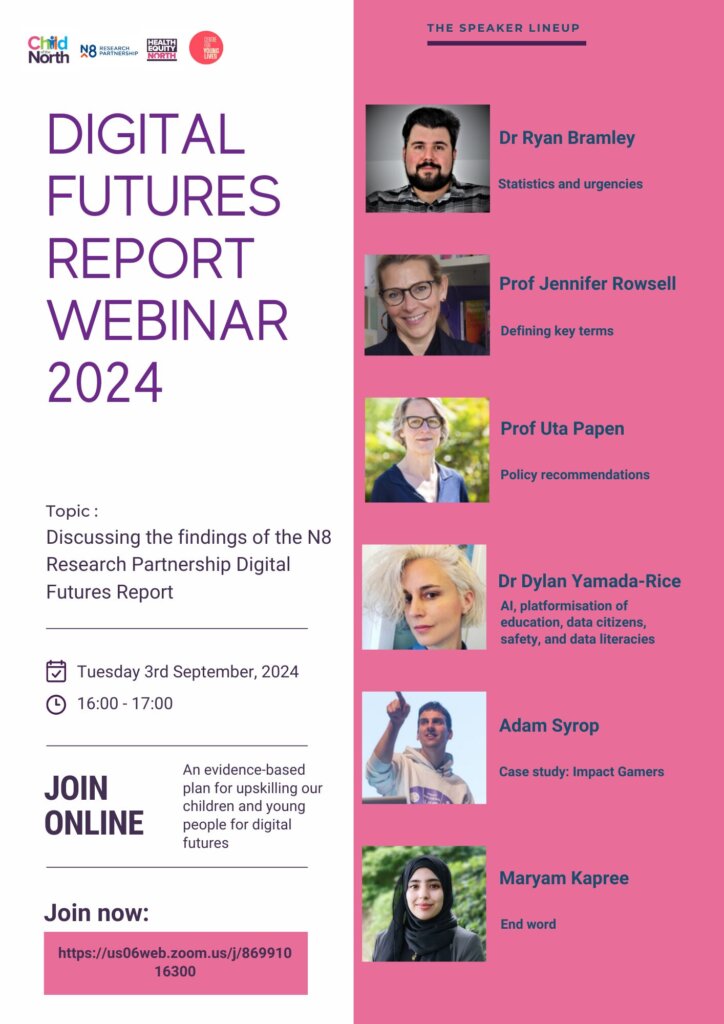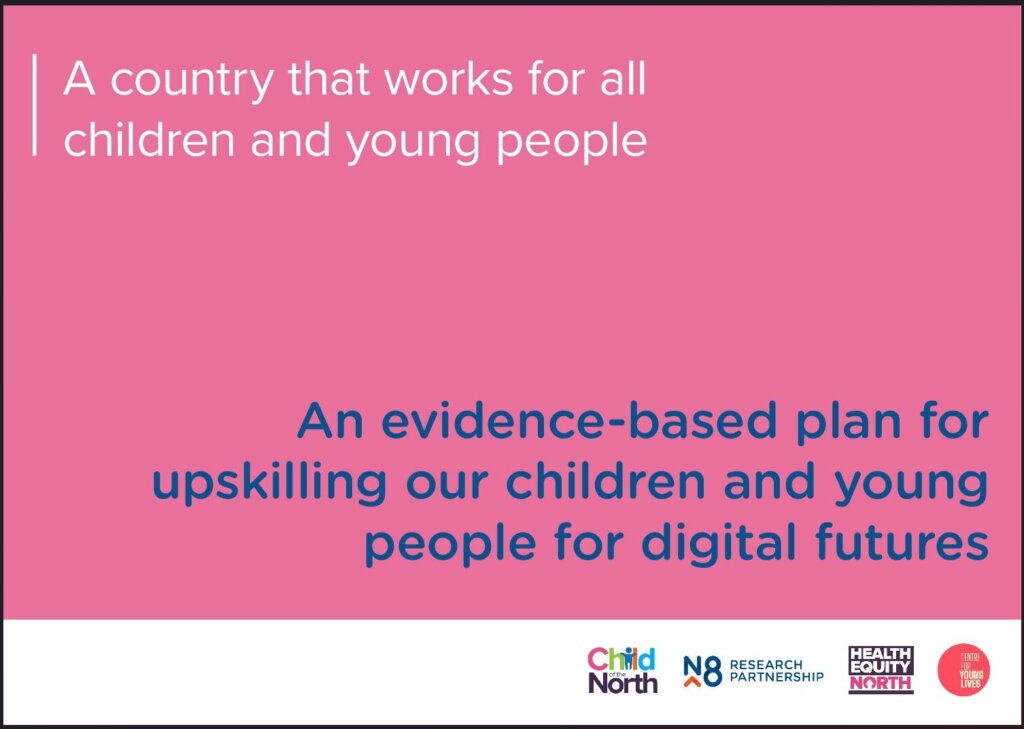Child of the North 2024/25 Campaign – Report 7
A country that works for all children and young people
An evidence-based plan for upskilling our children and young people for digital futures
The seventh report in a year-long series – produced jointly by Child of the North and the Centre for Young Lives – that seeks to deliver a country that works for all children and young people, puts forward new proposals and highlights innovations to close a digital divide which is holding back the life chances of millions of children in the UK, and to enable them to navigate digital content critically and responsibly.
The report, An evidence-based plan for upskilling our children and young people for digital futures, warns that ‘digital exclusion’ is still leaving behind millions of children and calls for a ‘digital vaccination’ for children to tackle the tsunami of fake news and disinformation.
It sets out how the UK’s digital landscape is an uneven playing field for children and young people and warns that millions of children are being left behind because they don’t have regular access to the technology and skills that they need to make the best use of digital devices and spaces in a responsible and creative way.
In a world where technological advances are increasingly rapid, and where Artificial Intelligence is set to have a profound impact on employment and future economies, the report highlights the huge economic costs of failing to close the digital divide. A lack of digital skills and literacy can also leave children more open to the risks of disinformation, fake news, and other online harms.
The report highlights how a significant proportion of children and young people in the UK lack access to digital skills and resources:
- 42% of young people (approximately 6 million children) do not have access to either home broadband or a laptop/desktop computer.
- Projections suggest that by 2030, 5 million workers will be under-skilled in basic digital capabilities, while 75% of young people feel they lack the necessary skills to thrive.
- Participation in IT subjects at GCSE level has dropped by 40% since 2015.
- 1 million people have either cut back or cancelled their internet packages due to financial constraints and approximately 2.4 million (21%) of people from the lowest socioeconomic backgrounds do not use the internet at home.
The report outlines a series of evidence-based policy recommendations based on extensive research undertaken across the North of England by Child of the North, including:
- Establishing a “Minimum Digital Living Standards” framework, including subsidised digital access to ensure that every household has the digital infrastructure necessary for effective participation. This could include basic digital infrastructure such as high-speed broadband, a functioning computer or laptop, and essential digital skills training.
- Enhancing digital inclusivity in schools through Continuing Professional Development (CPD) for educators. Current constraints on teachers’ time and the lack of structured support for CPD is hindering their ability to stay current with digital advancements, affecting the quality of digital education provided to students. Digital training packages for in-service teachers and other educational organisations and networks should be co-designed and continuously updated by multi-academy trusts, local education authorities, and industry experts.
- Creating a national Digital Creativity “Skills Commons”, fostering cross-sectional partnerships and network development. Currently, there is no consolidated, easily accessible platform that offers comprehensive support for digital creativity skills development. An open-access, subscription-free Digital Creativity Skills Commons could provide a range of evidence-informed resources, including training materials, funding guidance, and a registry of relevant agencies and charities.
The report also highlights different forward-thinking projects in the North of England that are already boosting both children’s access to the internet and their digital skills.
Report Webinar
Save the date at 4-5pm on Tuesday 3rd September for a webinar in which a number of the report’s authors and experts in the field will be discussing the findings and policy recommendations. Confirmed speakers include:
- Ryan Bramley (University of Sheffield)
- Jennifer Rowsell (University of Sheffield)
- Uta Papen (Lancaster University)
- Dylan Yamada-Rice (University of Plymouth)
- Adam Syrop (Impact Gamers)
To join the webinar, please follow this link: https://us06web.zoom.us/j/86991016300

Anne Longfield, Executive Chair of the Centre for Young Lives, said:
“Children are growing up digital but we are not giving them the technology and skills they need to make the most of the opportunities it brings or protection they need to navigate the online world safely. Technology and the internet provide access to a world of opportunity and are now a crucial part of childhood and our futures.
“The recent outbreaks of violence in England have shown the consequences of disinformation and its impact on the real world. It is crucial that we develop more effective ways of preventing children and young people from being exposed to fake news and vaccinate them against its dangers.
“That means providing children with the digital skills they need, providing teachers with the time and training to keep up to date with digital advancement, and ensuring children are learning about disinformation and other potential online harms from an early age..
“We also need to equip children for the digital world they live in. Four in ten children do not have either home broadband or a laptop or desktop computer. This is not just a problem that happened during Covid. This ongoing digital divide is still leaving behind millions of children, which can have profound implications for their educational outcomes and future employment prospects.
“We can’t hope to achieve the aim of becoming a world-beating economy with a well-trained and well-educated workforce for as long as a substantial number of young people are shut out of the digital world.”
Dr Camilla Kingdon, former President of the Royal College of Paediatrics and Child Health, said:
“The world around us is changing staggeringly fast. The Technology Revolution is likely to bring the greatest changes to how we live and work since the Industrial Revolution. “The opportunities are potentially incredible. However the truest and deepest impact will only be realised if our entire population is ready and skilled to embrace the changes and reap the rewards.
“This Report outlines the existing digital inequalities which are now deeply entrenched amongst children, especially those growing up in poverty, as well as stark geographical discrepancies. Crucially, the Report makes a series of recommendations and showcases work that is already successfully tackling this problem.
“Time is not on our side. I commend this report to our new government and hope that they will urgently work to help equip children with the skills to safely take advantage of the vital opportunities the digital world offers.”
Professor Mark Mon Williams, Child of the North report series editor, said:
“The UK’s future depends on our children and young people acquiring digital skills. The prosperity of countries will increasingly depend on their ability to harness the digital revolution and this needs a workforce with the necessary technological skills. Upskilling the next generation will also protect them against the countless nefarious actors in the online world and create a population who can distil useful facts and discard misinformation.
“This report lays out the evidence for the new government so that they can work with and through education settings to ‘digitally vaccinate’ the next generation and ensure all children and young people have the skills required for the jobs of the future.”
Professor Jennifer Rowsell and Dr Ryan Bramley, from the University of Sheffield’s School of Education, and Executive Report editors, said:
“The age of AI, data literacies, and the platformisation of education is upon us and children and young people must be able to navigate their digital lives critically and safely. The Child of the North and Centre for Young Lives report gives a detailed picture of digital inequalities in the UK with new proposals and strategies for changes to education and inspiring research spotlights.
“It has been an honour to work as academic experts with the Child of the North Team to push for the changes that can help the new government reimagine education.”
Sign up for updates on our 2024/25 Campaign
We will only use this data for the purposes of providing updates on the Child of the North 2024/25 campaign and report series. For more information see the Privacy Policy at https://www.sheffield.ac.uk/privacy
Previous Reports
Previous reports can be found archived on our Child of the North Reports page.
Contact Us
Stephen Parkinson, Research Partnership Manager




